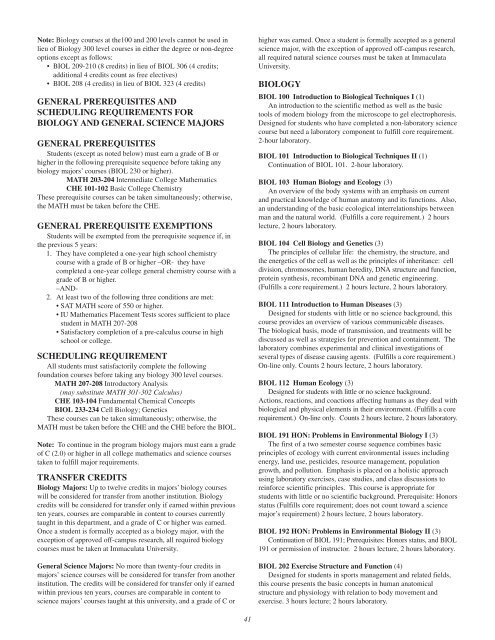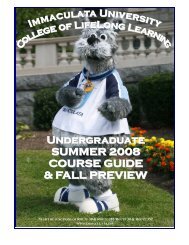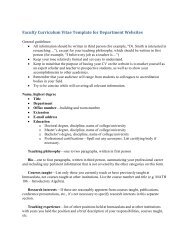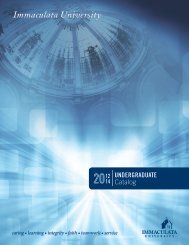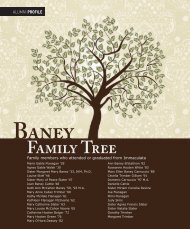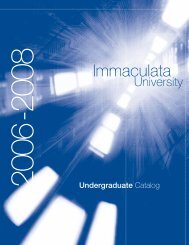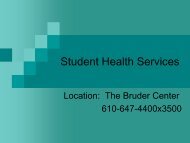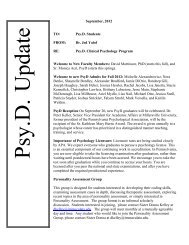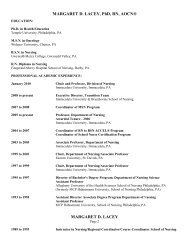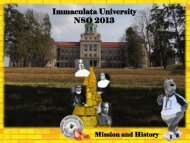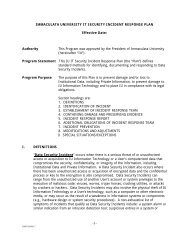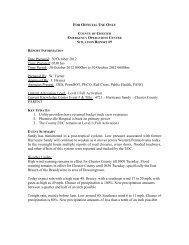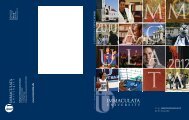Undergraduate Catalog 2008-2010 - Immaculata University
Undergraduate Catalog 2008-2010 - Immaculata University
Undergraduate Catalog 2008-2010 - Immaculata University
You also want an ePaper? Increase the reach of your titles
YUMPU automatically turns print PDFs into web optimized ePapers that Google loves.
Note: Biology courses at the100 and 200 levels cannot be used in<br />
lieu of Biology 300 level courses in either the degree or non-degree<br />
options except as follows:<br />
• BIOL 209-210 (8 credits) in lieu of BIOL 306 (4 credits;<br />
additional 4 credits count as free electives)<br />
• BIOL 208 (4 credits) in lieu of BIOL 323 (4 credits)<br />
GENERAL PREREQUISITES AND<br />
SCHEDULING REQUIREMENTS FOR<br />
BIOLOGY AND GENERAL SCIENCE MAJORS<br />
GENERAL PREREQUISITES<br />
Students (except as noted below) must earn a grade of B or<br />
higher in the following prerequisite sequence before taking any<br />
biology majors’ courses (BIOL 230 or higher).<br />
MATH 203-204 Intermediate College Mathematics<br />
CHE 101-102 Basic College Chemistry<br />
These prerequisite courses can be taken simultaneously; otherwise,<br />
the MATH must be taken before the CHE.<br />
GENERAL PREREQUISITE EXEMPTIONS<br />
Students will be exempted from the prerequisite sequence if, in<br />
the previous 5 years:<br />
1. They have completed a one-year high school chemistry<br />
course with a grade of B or higher –OR- they have<br />
completed a one-year college general chemistry course with a<br />
grade of B or higher.<br />
–AND-<br />
2. At least two of the following three conditions are met:<br />
• SAT MATH score of 550 or higher.<br />
• IU Mathematics Placement Tests scores sufficient to place<br />
student in MATH 207-208<br />
• Satisfactory completion of a pre-calculus course in high<br />
school or college.<br />
SCHEDULING REQUIREMENT<br />
All students must satisfactorily complete the following<br />
foundation courses before taking any biology 300 level courses.<br />
MATH 207-208 Introductory Analysis<br />
(may substitute MATH 301-302 Calculus)<br />
CHE 103-104 Fundamental Chemical Concepts<br />
BIOL 233-234 Cell Biology; Genetics<br />
These courses can be taken simultaneously; otherwise, the<br />
MATH must be taken before the CHE and the CHE before the BIOL.<br />
Note: To continue in the program biology majors must earn a grade<br />
of C (2.0) or higher in all college mathematics and science courses<br />
taken to fulfill major requirements.<br />
TRANSFER CREDITS<br />
Biology Majors: Up to twelve credits in majors’ biology courses<br />
will be considered for transfer from another institution. Biology<br />
credits will be considered for transfer only if earned within previous<br />
ten years, courses are comparable in content to courses currently<br />
taught in this department, and a grade of C or higher was earned.<br />
Once a student is formally accepted as a biology major, with the<br />
exception of approved off-campus research, all required biology<br />
courses must be taken at <strong>Immaculata</strong> <strong>University</strong>.<br />
General Science Majors: No more than twenty-four credits in<br />
majors’ science courses will be considered for transfer from another<br />
institution. The credits will be considered for transfer only if earned<br />
within previous ten years, courses are comparable in content to<br />
science majors’ courses taught at this university, and a grade of C or<br />
higher was earned. Once a student is formally accepted as a general<br />
science major, with the exception of approved off-campus research,<br />
all required natural science courses must be taken at <strong>Immaculata</strong><br />
<strong>University</strong>.<br />
BIOLOGY<br />
BIOL 100 Introduction to Biological Techniques I (1)<br />
An introduction to the scientific method as well as the basic<br />
tools of modern biology from the microscope to gel electrophoresis.<br />
Designed for students who have completed a non-laboratory science<br />
course but need a laboratory component to fulfill core requirement.<br />
2-hour laboratory.<br />
BIOL 101 Introduction to Biological Techniques II (1)<br />
Continuation of BIOL 101. 2-hour laboratory.<br />
BIOL 103 Human Biology and Ecology (3)<br />
An overview of the body systems with an emphasis on current<br />
and practical knowledge of human anatomy and its functions. Also,<br />
an understanding of the basic ecological interrelationships between<br />
man and the natural world. (Fulfills a core requirement.) 2 hours<br />
lecture, 2 hours laboratory.<br />
BIOL 104 Cell Biology and Genetics (3)<br />
The principles of cellular life: the chemistry, the structure, and<br />
the energetics of the cell as well as the principles of inheritance: cell<br />
division, chromosomes, human heredity, DNA structure and function,<br />
protein synthesis, recombinant DNA and genetic engineering.<br />
(Fulfills a core requirement.) 2 hours lecture, 2 hours laboratory.<br />
BIOL 111 Introduction to Human Diseases (3)<br />
Designed for students with little or no science background, this<br />
course provides an overview of various communicable diseases.<br />
The biological basis, mode of transmission, and treatments will be<br />
discussed as well as strategies for prevention and containment. The<br />
laboratory combines experimental and clinical investigations of<br />
several types of disease causing agents. (Fulfills a core requirement.)<br />
On-line only. Counts 2 hours lecture, 2 hours laboratory.<br />
BIOL 112 Human Ecology (3)<br />
Designed for students with little or no science background.<br />
Actions, reactions, and coactions affecting humans as they deal with<br />
biological and physical elements in their environment. (Fulfills a core<br />
requirement.) On-line only. Counts 2 hours lecture, 2 hours laboratory.<br />
BIOL 191 HON: Problems in Environmental Biology I (3)<br />
The first of a two semester course sequence combines basic<br />
principles of ecology with current environmental issues including<br />
energy, land use, pesticides, resource management, population<br />
growth, and pollution. Emphasis is placed on a holistic approach<br />
using laboratory exercises, case studies, and class discussions to<br />
reinforce scientific principles. This course is appropriate for<br />
students with little or no scientific background. Prerequisite: Honors<br />
status (Fulfills core requirement; does not count toward a science<br />
major’s requirement) 2 hours lecture, 2 hours laboratory.<br />
BIOL 192 HON: Problems in Environmental Biology II (3)<br />
Continuation of BIOL 191; Prerequisites: Honors status, and BIOL<br />
191 or permission of instructor. 2 hours lecture, 2 hours laboratory.<br />
BIOL 202 Exercise Structure and Function (4)<br />
Designed for students in sports management and related fields,<br />
this course presents the basic concepts in human anatomical<br />
structure and physiology with relation to body movement and<br />
exercise. 3 hours lecture; 2 hours laboratory.<br />
41


